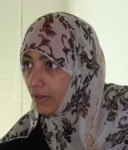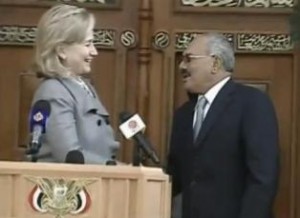 If Americans should take anything from today’s protests in Egypt, last weekend’s protests in Pakistan and Yemen, and the popular revolution in Tunisia, it is this: the United States spends more money enabling corruption in the Muslim world than it does supporting democracy.
If Americans should take anything from today’s protests in Egypt, last weekend’s protests in Pakistan and Yemen, and the popular revolution in Tunisia, it is this: the United States spends more money enabling corruption in the Muslim world than it does supporting democracy.
Consider the example of Yemen. Over the weekend, Al Jazeera English reported that police “fired tear gas at the demonstrators, whose grievances include proposed constitutional changes that would allow the president to rule for a lifetime.” The protests in the capital, Sana’a, were inspired in part by the the arrest of journalist and organizer Tawakul Karman.
Karman, pictured, was freed on Monday. A few news organizations that covered the protests mentioned that Karman was recently nominated for a US State Department award for her courage in the face of threats. No one, however, pointed out that her anti-corruption group, Women Journalists Without Chains, has received American government funds through the Middle East Partnership Initiative.
Kamran’s organization benefited from a grant worth tens of thousands of dollars. The government that threw her in jail for protesting without a permit has received more than $300 million worth of US military assistance over the years.
Karman belongs to the opposition party, Islah. Yemeni President Ali Abdullah Saleh (pictured below) claims Islah has terrorist connections.
So did the US government make a mistake by supporting the work of a “revolutionary” Islamist who could be portrayed, through the fuzzy logic of the war on terror, as being only a few steps removed from Al Qaeda?
No. If the US made a mistake, it was supplying guns and bombs to yet another authoritarian ruler whose oppressive tactics only fuel public resentment.
 This classified State Department cable—from the batch of thousands leaked by Bradley Manning—all but accuses President Saleh of attempting to use US military assistance to murder his political opponents.
This classified State Department cable—from the batch of thousands leaked by Bradley Manning—all but accuses President Saleh of attempting to use US military assistance to murder his political opponents.
The backdrop for the year-old cable is that Saudi Arabia and Yemen have been using American hardware to fight an insurgent group, the Houthis, along the border shared by the two countries. The cable describes a meeting between Saudi Assistant Minister of Defense and Aviation Prince Khaled bin Sultan and the US Ambassador to Riyadh, James B. Smith.
Smith threatened to stop supplying satellite imagery to Saudi Arabia “in light of evidence that Saudi aircraft may have struck civilian targets”—in particular, a hospital.
“If we had the Predator [drone], maybe we would not have this problem,“ Prince Khaled replied.
The prince’s cynical bid for more advanced weaponry is perhaps the least objectionable exchange in this troubling document, which, aside from a Miami Herald story and an article in an aviation trade journal, seems to have gone unreported by the press.
In the cable, Prince Khaled explains how the Saudi Air Force selects targets in northern Yemen based on the recommendations of a “Saudi-Yemeni joint committee” of senior officers. Here’s the key passage:
Prince Khaled also reported that the Saudis had problems with some of the targeting recommendations received from the Yemeni side. For instance, there was one occasion when Saudi pilots aborted a strike, when they sensed something was wrong about the information they received from the Yemenis. It turned out that the site recommended to be hit was the headquarters of General Ali Mohsen Al-Ahmar, the Yemeni northern area military commander, who is regarded as a political opponent to President Saleh. This incident prompted the Saudis to be more cautious about targeting recommendations from the Yemeni government.
Some background: Ali Mohsen happens to be Saleh’s half-brother. He also reportedly recruited Yemeni fighters for Osama Bin Laden back in the 1980s, when Bin Laden shared a common, anti-Soviet cause with the US. Ali Mohsen’s history goes unmentioned in the State Department cable, and he doesn’t appear on current public US terrorist lists. All of this context is important in the broader context of the war on terror, but it’s not necessarily germane to the issue raised in the cable: That Saleh’s government may be supplying targets based on political opportunism.
The prince does not claim that Saleh personally placed a rival on a hit list. But the leaked State Department cables offer more reasons to suspect Saleh would prefer American bombs to do his political dirty work. In one cable, the Yemeni president attempts to tie the Islah party—”largely recognized as moderate”—to Al Qaeda. In another cable, Saleh’s foreign minister claims that an Islah leader’s public criticism of civilian casualties in the US-backed airstrikes constitute a “defense” of Al Qaeda.
The good news, judging from the tone of the cables, is that US diplomats seem to be aware that Saleh’s information may not be 100 percent reliable.
The bad news is that awareness of such opportunism by the Yemeni government appears to have little effect so far on American policy in the region. The arms deals for authoritarians keep getting bigger, while support for activists like Karman could be cut to zero.